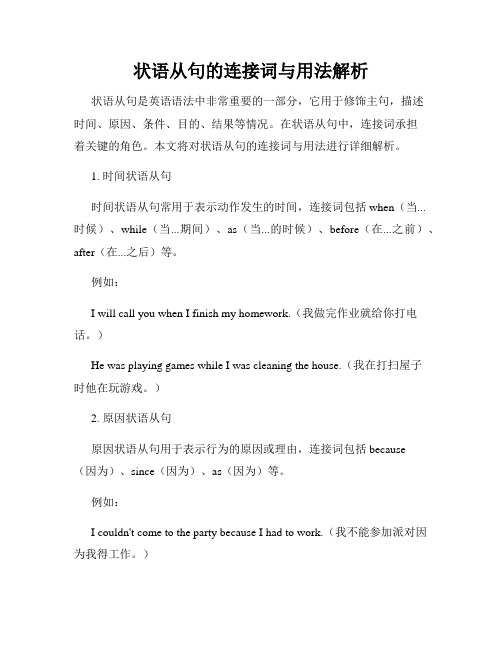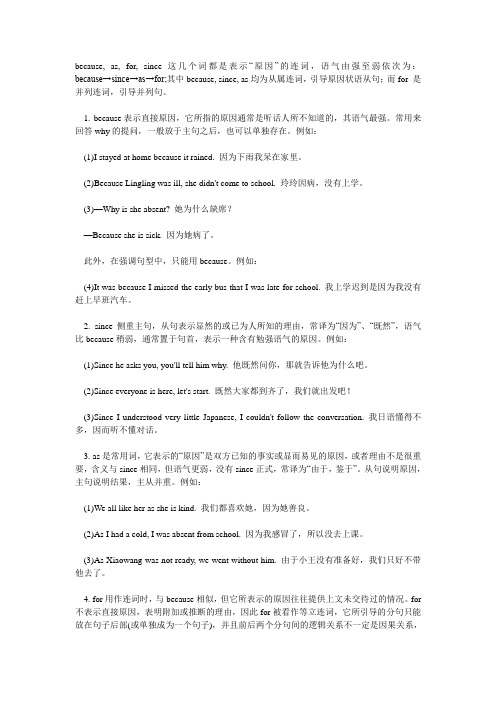对原因状语从句几个连词的区分
英语语法中的连词与从句

英语语法中的连词与从句英语语法中的连词与从句是构建复杂句子的重要组成部分。
连词用于连接句子、短语或单词,而从句是由主语和谓语构成的句子,可以在复合句中充当名词、形容词或副词。
一、连词与从句的分类1. 引导名词性从句的连词:(1)连词 that:用于引导宾语从句、主语从句、表语从句和同位语从句。
(2)连词 whether/if:用于引导宾语从句和主语从句,区别在于whether 是否由于可选择性而引入的疑问。
(3)连词 who/whom/whose/which/what/when/where/why/how:分别用于引导主语从句、宾语从句、定语从句、状语从句和名词性从句。
2. 引导特殊疑问句从句的连词:(1)连词 who/whom/whose/which/what/when/where/why/how:用于引导特殊疑问句从句。
(2)连词 whether/if:用于引导特殊疑问句从句,表示“是否”。
3. 引导时间、原因、条件、让步、目的、结果从句的连词:(1)引导时间从句的连词:when/while/as/once/before/after/since/until/till。
(2)引导原因从句的连词:because/as/since/now that/for。
(3)引导条件从句的连词:if/unless/so long as/on conditionthat/provided that/as if。
(4)引导让步从句的连词:though/although/even if/eventhough/while/whereas。
(5)引导目的从句的连词:so that/in order that。
(6)引导结果从句的连词:so that/such...that/so...that/enough...to。
二、连词与从句的使用规则1. 从句的位置:(1)宾语从句一般紧跟在动词或介词之后。
(2)主语从句常位于句首。
初中英语状语从句知识点:原因状语从句

初中英语状语从句知识点:原因状语从句初中英语状语从句知识点:原因状语从句连词有:because as since now that等(1) 区分because, as, since, for①because表示人们不知道的直接的原因或理由,着重点在从句,其所引导的从句,为全句句意的中心所在。
通常用于回答why引出的疑问句,语气最强,除特别强调外,该从句一般位于主句后面,不能与so连用但是可以与so进行同义句转换。
I didn’t go aboard with her because I couldn’t afford it.我没有和她一起出国是因为费用太高。
②as引导的原因状语从句所传递的通常是已知信息,从句多位于主句之前,表示双方那个已知的理由,如:As I didn’t know the way,I asked a policeman.我不认识路,因而问警察。
③since引导的原因状语从句多表示大家众所周知的理由,如:Since traveling by air is much faster, they decided to take a plane.既然乘飞机旅行快得多,他们就决定坐飞机。
④for表示的理由是附加的或推断的,并非此原因,通常与主句用逗号隔开,不位于句首,如:He must be not at home, for the telephone isn’t answered.用because, as, since, for 填空:We’ll have to go to bed early ___________ we’ll start off early tomorro w.___________ you know all about it, tell me please.____________ all the seats were taken, I had to stand.He must be at work, __________ the light in his office is still on.Lily didn’t go to school ___________ she was ill.=_________________________________________________________.(4) now that引导的原因状语从句Now that “因为;既然”,通常可以和since换用。
状语从句的连词和位置

状语从句的连词和位置在英语语法中,状语从句是一种被用来修饰主句或其他形式从句的从句。
它通过引导词或连词来引出,用以表达时间、地点、原因、条件、程度等状况。
在使用状语从句时,需要注意选择适当的连词和合适的位置,以确保整个句子的语法结构正确而通顺。
一、连词的选择在引导状语从句时,常用的连词有“when”、“where”、“why”、“if”、“unless”、“since”、“as”、“although”等。
不同的连词表达的意思和句子结构有所不同,因此在使用时需根据句子的具体语境和需要进行选择。
1. 当引导时间状语从句时,常用的连词是“when”,用来表示句子发生的时间点或时间段。
例如:I will call you when I arrive at the airport. (当我到达机场时,我会给你打电话。
)2. 引导地点状语从句时,常用的连词是“where”,表示句子发生的地点。
例如:She still remembers the house where she grew up. (她仍然记得她长大的那所房子。
)3. 引导原因状语从句时,常用的连词是“why”,表示句子发生的原因。
例如:I don't know why he didn't come to the party. (我不知道他为什么没有来参加派对。
)4. 引导条件状语从句时,常用的连词是“if”、“unless”等,表示句子发生的条件。
例如:If it rains tomorrow, we will stay indoors. (如果明天下雨,我们会呆在室内。
)5. 引导程度状语从句时,常用的连词是“as”、“though”、“although”等,表示句子的程度。
例如:She sings as if she were an angel. (她唱歌的样子就像个天使一样。
)二、连词的位置除了选择合适的连词,状语从句的位置也是十分重要的。
一、原因状语从句:常用的引导连词有because,as和since。

一、原因状语从句:常用的引导连词有because , as和since。
一、原因状语从句:常用的引导连词有because , as和since。
三者的区别是:在回答问题的时候,使用because;对于显而易见的原因,常用as或since;as和since的从句常放在主句之前,而because的从句常放在主句之后。
eg.Why did you go? I went because Tom told me to go.你为何去,那是因为汤姆叫我去。
He was angry not because we were late but because we made a noise.他很生气不是因为我们来迟了,而是因为我们弄出了声音。
As it was raining hard, we had to be indoors. 由于雨太大,我们只好呆在家里。
Since you feel ill, you’d better not go to work. 既然你感觉不舒服,你最好不要去上班了。
注意:because是连词,引导原因壮语从句,不能与so连用;二because of 是短语介词,只能引导表示原因的短语。
二、结果状语从句:引导结果状语从句的常用连词有:so…that/such/…that(如此……以至于);so that(结果)。
常用句型为:so +形容词/副词 + thatso + 形容词 + a/an + 单数可数名词 + thatsuch + a/an + 形容词 + 单数可数名词 + thatsuch + 形容词 + 复数可数名词 + thatsuch + 形容词 + 不可数名词 + thatHe spoke so fast that I couldn’t follow him.他讲得太快我跟不上。
It was such a good day(=It was so good a day) that we all went swimming.天气那么好,我们都去游泳了。
状语从句的连接词与用法解析

状语从句的连接词与用法解析状语从句是英语语法中非常重要的一部分,它用于修饰主句,描述时间、原因、条件、目的、结果等情况。
在状语从句中,连接词承担着关键的角色。
本文将对状语从句的连接词与用法进行详细解析。
1. 时间状语从句时间状语从句常用于表示动作发生的时间,连接词包括when(当...时候)、while(当...期间)、as(当...的时候)、before(在...之前)、after(在...之后)等。
例如:I will call you when I finish my homework.(我做完作业就给你打电话。
)He was playing games while I was cleaning the house.(我在打扫屋子时他在玩游戏。
)2. 原因状语从句原因状语从句用于表示行为的原因或理由,连接词包括because(因为)、since(因为)、as(因为)等。
例如:I couldn't come to the party because I had to work.(我不能参加派对因为我得工作。
)Since it's raining outside, we should stay indoors.(因为外面下雨,我们应该呆在室内。
)3. 条件状语从句条件状语从句用于表示某种条件下会发生的情况,连接词包括if (如果)、unless(除非)、provided that(倘若)、as long as(只要)等。
例如:If you study hard, you will pass the exam.(如果你努力学习,你会通过考试。
)I won't go swimming unless it stops raining.(除非雨停,否则我不会去游泳。
)4. 目的状语从句目的状语从句用于表示达到某种目的或意图的行动,连接词包括so that(以便)、in order that(为了)、lest(以免)等。
状语从句分类及常用连词

状语从句分类及常用连词一、状语从句分类及常用连词:类别连词地点状语从句where,wherever时间状语从句when, whenever, while, as, before, after, since, till, once, assoon as,etc.原因状语从句because, since, as, for, now that, etc.目的状语从句in order that, so that, that, etc.结果状语从句so…that, so that, such…that, that, etc.条件状语从句if, unless, as(so)long as, etc.让步状语从句though, although, even if, even though, however, whatever, as,etc.比较状语从句as…as, so…as, than, etc.方式状语从句as, as if, as though, etc.二、各种状语从句的连词的用法区别1 地点状语从句地点状语从句通常由where, wherever 引导。
Where I live there are plenty of trees. 我住的地方树很多。
Wherever I am I will be thinking of you. 不管我在哪里我都会想到你。
2 方式状语从句方式状语从句通常由as, (just) as…so…, as if, as though引导。
1)as, (just) as…so…引导的方式状语从句通常位于主句后,但在(just)as…so…结构中位于句首,这时as从句带有比喻的含义,意思是"正如…","就像",多用于正式文体,例如:Always do to the others as you would be done by.你希望人家怎样待你,你就要怎样待人。
原因状语连词

because, as, for, since这几个词都是表示“原因”的连词,语气由强至弱依次为:because→since→as→for;其中because, since, as均为从属连词,引导原因状语从句;而for 是并列连词,引导并列句。
1. because表示直接原因,它所指的原因通常是听话人所不知道的,其语气最强。
常用来回答why的提问,一般放于主句之后,也可以单独存在。
例如:(1)I stayed at home because it rained. 因为下雨我呆在家里。
(2)Because Lingling was ill, she didn't come to school. 玲玲因病,没有上学。
(3)—Why is she absent? 她为什么缺席?—Because she is sick. 因为她病了。
此外,在强调句型中,只能用because。
例如:(4)It was because I missed the early bus that I was late for school. 我上学迟到是因为我没有赶上早班汽车。
2. since侧重主句,从句表示显然的或已为人所知的理由,常译为“因为”、“既然”,语气比because稍弱,通常置于句首,表示一种含有勉强语气的原因。
例如:(1)Since he asks you, you'll tell him why. 他既然问你,那就告诉他为什么吧。
(2)Since everyone is here, let's start. 既然大家都到齐了,我们就出发吧!(3)Since I understood very little Japanese, I couldn't follow the conversation. 我日语懂得不多,因而听不懂对话。
3. as是常用词,它表示的“原因”是双方已知的事实或显而易见的原因,或者理由不是很重要,含义与since相同,但语气更弱,没有since正式,常译为“由于,鉴于”。
原因状语从句的引导词

because, since, as, now that,for之间的区别because, as, for, since这几个词都是表示“原因”的连词,语气由强至弱依次为:because →since→as→for;其中because, since, as均为从属连词,引导原因状语从句;而for 是并列连词,引导并列句。
1. because表示直接原因,它所指的原因通常是听话人所不知道的,其语气最强。
常用来回答why的提问,一般放于主句之后,也可以单独存在。
例如:(1)I stayed at home because it rained. 因为下雨我呆在家里。
(2)Because Ling ling was ill, she didn't come to school. 玲玲因病,没有上学。
(3)—Why is she absent? 她为什么缺席?—Because she is sick. 因为她病了。
﹡此外,在强调句型中,只能用because。
例如:(4)It was because I missed the early bus that I was late for school. 我上学迟到是因为我没有赶上早班汽车。
2. since侧重主句,从句表示显然的或已为人所知的理由,常译为“因为”、“既然”,语气比because稍弱,通常置于句首,表示一种含有勉强语气的原因。
例如:(1)Since he asks you, you'll tell him why. 他既然问你,那就告诉他为什么吧。
(2)Since everyone is here, let's start. 既然大家都到齐了,我们就出发吧!(3)Since I understood very little Japanese, I couldn't follow the conversation. 我日语懂得不多,因而听不懂对话。
- 1、下载文档前请自行甄别文档内容的完整性,平台不提供额外的编辑、内容补充、找答案等附加服务。
- 2、"仅部分预览"的文档,不可在线预览部分如存在完整性等问题,可反馈申请退款(可完整预览的文档不适用该条件!)。
- 3、如文档侵犯您的权益,请联系客服反馈,我们会尽快为您处理(人工客服工作时间:9:00-18:30)。
对原因状语从句几个连词的区分
In the morning I didn’t need to get out early. I would always spend over an hour just surfing_______Internet. The same would happen at night.
I didn’t go to bed ________I felt very tired and sleepy. Later I made a _________(decide) to develop a new habit because I didn’t like the feeling I had when_________(waste) time on the computer. I simply decided that I would not go near my computer before 9 a.m. or after 9 p.m.,________has worked indeed.
Now, I can’t say that I never quit, but on the whole, I find I feel much better, more_________(relax) and more in control of m day and my rest. Every time I quit, I remind________immediately why I hoped to develop this habit in the beginning. It is also helpful to keep things in order. ________I don’t yet have a cellphone, my new habit means it can be________twenty –hours or more that I will be away from my emails. I am happy that I can decide when to turn on my computer and deal with emails and________to spend my time.
答案:the; felt; decision; waiting; which; relaxed; myself; as; for; how because, as, for, since这几个词都是表示“原因”的连词,语气由强至弱依次为:because→since→as→for;其中because, since, as均为从属连词,引导原因状语从句;而for 是并列连词,引导并列句.
1. because表示直接原因,它所指的原因通常是听话人所不知道的,其语气最强.常用来回答why的提问,一般放于主句之后,也可以单独存在.例如:
(1)I stayed at home because it rained. 因为下雨我呆在家里.
(2)Because Lingling was ill, she didn”t come to school. 玲玲因病,没有上学.
(3)�Why is she absent? 她为什么缺席?
�Because she is sick. 因为她病了.
此外,在强调句型中,只能用because.例如:
(4)It was because I missed the early bus that I was late for school. 我上学迟到是因为我没有赶上早班汽车.
2. since侧重主句,从句表示显然的或已为人所知的理由,常译为“因为”、“既然”,语气比because稍弱,通常置于句首,表示一种含有勉强语气的原因.例如:
(1)Since he asks you, you”ll tell him why. 他既然问你,那就告诉他为什么吧.
(2)Since everyone is here, let”s start. 既然大家都到齐了,我们就出发吧!
(3)Since I understood very little Japanese, I couldn”t follow the conversation. 我日语懂得不多,因而听不懂对话.
3. as是常用词,它表示的“原因”是双方已知的事实或显而易见的原因,或者理由不是很重要,含义与since相同,但语气更弱,没有since正式,常译为“由于,鉴于”.从句说明原因,主句说明结果,主从并重.例如:
(1)We all like her as she is kind. 我们都喜欢她,因为她善良.
(2)As I had a cold, I was absent from school. 因为我感冒了,所以没去上课.
(3)As Xiaowang was not ready, we went without him. 由于小王没有准备好,我们只好不带他去了.
4. for用作连词时,与because相似,但它所表示的原因往往提供上文未交待过的情况.for不表示直接原因,表明附加或推断的理由,因此for 被看作等立连词,它所引导的分句只能放在句子后部(或单独成为一个句子),并且前后两个分句间的逻辑关系不一定是因果关系,其间用逗号隔开,且for不可置于句首,for的这一用法常用在书面语中,较正式.例如:
(1)The days are short, for it is now December. 白天短了,因为现在已是十二月份.
(2)It must have rained, for the ground is wet. (从“地面潮湿”作出“下过雨”的推测,但地湿并不一定是下雨所致, for不可以换为because.)
(3)The ground is wet because it has rained. (“下雨”是“地上潮湿”的直接原因.)
前后两个分句间有一定的因果关系时(有时很难区分是直接原因,还是推测性原因),for与because可以互换使用.例如:
(4)I could not go, for / because I was ill. 我没能去,是因为我病了.
(5)He felt no fear, for / because he was a brave boy. 他没有害怕,因为他是个勇敢的男孩。
